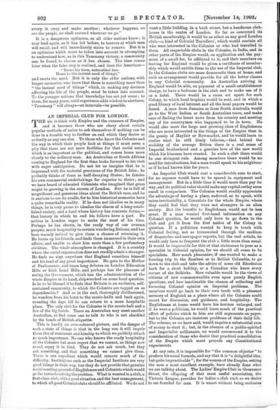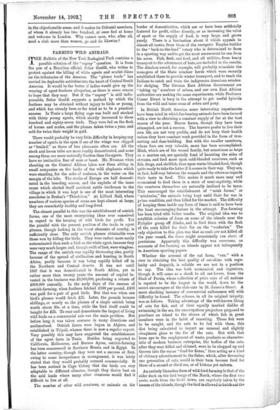AN IMPERIAL CLUB FOR LONDON.
THE air is thick with Empire and the rumours of Empire, and it becomes those who are chary about certain popular methods of union to ask themselves if nothing can be done in a humble way to further an end which they desire as ardently as any one else. To those who know the Colonies and the way in which their people look at things it must seem a pity that there are not more facilities for that social union which is as important as the political, and comes home more closely to the ordinary man. An Australian or South African coming to England for the first time looks forward to his visit with eager anticipation. Do not let us imagine that he is impressed with the material greatness of the British Isles; he probably thinks of them as half-decaying States; he fancies his own commercial undertakings far superior to theirs; and we have heard of educated Colonists who imagined that grass might be growing in the streets of London. But he is full of magnificent and generous ideas about the British race, and he is anxious to see its cradle, for to him historical memories have a quite remarkable reality. If he does not idealise us in many things, he is very prone to idealise the charm of a long-estab- lished society, and a land where history has concrete forms,— that history in which he and his fellows have a part. He arrives in London eager to make the most of his time. Perhaps he has shown, in the ready way of our oversea peoples, much hospitality to certain wandering Britons, and has been warmly invited to give them a chance of returning it. He hunts up his friends, and finds them immersed in their own affairs, and unable to show him more than a few perfunctory civilities. The whole atmosphere is changed. It is a country where the social organisation does not readily admit a stranger. He finds no sign anywhere that England considers himself and his land of any great importance. He goes to the Mother of Parliaments, and hears long debates on London Education Bills or Irish Land Bills, and perhaps has the pleasure of seeing the Government, which has the administration of the whole Empire in its hand, shipwrecked on some local question. Is he to be blamed if he feels that Britain is an exclusive, self- contained community, to which the Colonies are tagged on as dependencies ? And so in the end, thoroughly disillusioned, he wanders from his hotel to the music-halls and back again, counting the days till he can return to a more hospitable place. The only club for the Colonies is the music-hall and a few of the big hotels. There an Australian may meet another Australian, or find some one to talk to who is not shackled by the bonds of British etiquette.
This is hardly an over-coloured picture, and the danger of such a state of things is that in the long run it will impair those ties of sentiment and kinship to which we publicly attach so much importance. No one who knows the ready hospitality of the Colonies but must regret that we cannot, as things now stand, repay it in kind. They do not ask much, but they ask something, and that something we cannot give them. There is one expedient which would remove much of the difficulty. Institutions such as the Imperial Institute are very good things in their way, but they do not provide that genuine social meeting-ground of Englishmen and Colonists which would go far towards solving the problem. What is wanted is a club, a first-class club, with a good situation and the best management, to which all good Colonial clubs shouM be affiliated. We do not want a little building in a back street, but a handsome club- house in the centre of London. So far as concerned its British membership, it would be as select as any good London club,—a kind of Colonial Travellers', which would contain all who were interested in the Colonies or who had travelled in them. All respectable clubs in the Colonies, in India, and in other parts of the Empire would, on application and the pay- ment of a small fee, be affiliated to it, and their members on leaving for England would be given a certificate of member- ship which would entitle them to the use of the Imperial club. In the Colonies clubs are more democratic than at home, and such an arrangement would provide for all the better classes in any Colonial community. An Australian arriving in England would be able, on payment of a small establishment charge, to have a bedroom in the club and to make use of it as a hoteL Thera would be a room set apart for each Colony, to which local trophies would be sent, and in which a good library of local interest and all the local papers would be found. A man from Jamaica or from South Australia would go to the West Indian or South Australian room, and make sure of finding the latest news from his country and meeting any of his countrymen who happened to be in town. He would also meet the large and growing class of Englishmen who are more interested in the things of the Empire than in the gossip of Mayfair or Newmarket, and he would learn to realise what he still dimly believes,—that behind the stolidity of the average Briton there is a real sense of Imperial brotherhood and a genuine love of the new world, which his kinsmen have created. In such a club there would be one stringent rule. Among members there would be no need for introductions, but a man would speak to his neighbour as if he had known him for years.
An Imperial Club would cost a considerable sum to start, for no expense would have to be spared in equipment and management. But in a little time it would more than pay its way, and its political value should make any capital outlay seem small in comparison. The Colonies would readily appreciate the advantage of having a place, endowed, so to speak, with extra-territoriality, a Consulate for the whole Empire, where they could feel that they were not strangers in an alien society. But the benefits to Englishmen would not be lese great. If a man wanted first-hand information on any Colonial question, he would only have to go down to the club and get it from the first native of the Colony in question. If a politician wanted to keep in touch with Colonial feeling, not as transmuted through the medium of despatches and newspaper reports, but the real article, he would only have to frequent the club a little more than usual. It would be impossible for this or that statesman to pose as a specialist in Colonial opinion, for we should all come to be specialists. How much pleasanter, if one wanted to make a hunting trip to the Zambesi or to British Columbia, to go down to the club and take the advice of some old Rhodesian back for a short holiday, or a Canadian who knew every corner of the Selkirks. How valuable would be the views of citizens of new commonwealths even upon purely English questions, and how inestimable the chance of collecting and focussing Colonial opinion on Imperial problems. The members would go back to their own lands with a pleasant memory of England as a place where all the Colonies could resort for discussion, and guidance, and hospitality. The Englishman at home would have his horizon enlarged, and if he were a politician, he would learn much of the practical effect of policies which to him are still arguments on paper, but to the Colonies are insistent problems of their daily life. The scheme, as we have said, would require a substantial sum of money to start it ; but, in the absence of a public-spirited and Imperialist millionaire, we would recommend it to the consideration of those who desire that practical consolidation of the Empire which must precede any Constitutional experiments.
At any rate, it is impossible for "the common objector" to produce his usual formula, and say that it is " a delightful idea, but quite impracticable " ; for the women of the Empire, setting the men a most excellent example, have already done what we are talking about. The Ladies' Empire Club in Grosvenor Street, the offspring of that most useful association, the Victoria League, provides for ladies a club such as we desire to see founded for men. It is • smart without being exclusive
in the objectionable sense, and it makes its Colonial members, of whom it already has two hundred, at once feel at home and welcome in London. Why cannot men, who, after all, ,need a club more than women, go and do likewise P















































 Previous page
Previous page